If you’re lucky enough to live in a fairly progressive or even populous place, it can feel like everyone and everything is queer. LGBTQ identities are everywhere: From The New York Times writing about they/them pronouns to the year’s second highest-grossing movie including an (albeit chaste) same-sex kiss. For the average queer person just trying to live their life, the focus of the mainstream microscope can be exhausting. For queer filmmakers, or filmmakers who happen to fall somewhere on the LGBTQ+ spectrum, it can be a double-edged sword.
John Waters, for example, bristles at being called an “openly gay director.” In sharing this fact with Luca Guadagnino, whom he spoke to recently at the Provincetown Film Festival, the “Call Me by Your Name” filmmaker concurred. “I don’t believe in openly anything,” Guadagnino said.
There is no doubt that the man who introduced Divine to the world makes queer films, his work is both defines and defies the very label. But it is absurdly redundant to label John Waters a queer filmmaker, as it is to saddle any other artist with a word that can be both empowering and limiting.
But Hollywood is a business, and most people (and producers) have very little imagination. The same issue plagues every creative field, that the act of selling art is in direct opposition to creating anything meaningful. In this unprecedented moment when LGBTQ+ stories feel almost overly ubiquitous, it can seem beneficial to market oneself as a queer filmmaker, but what really goes on behind closed doors?
To take the current temperature, we spoke to four of our favorite queer filmmakers, from venerated auteurs to exciting up-and-comers. Andrew Ahn, who directed the hit gay Asian American rom-com “Fire Island”; John Cameron Mitchell, whose provocative sex romp “Shortbus” was banned on Prime 15 years after its initial release; Céline Sciamma, who went big by playing small in “Petite Maman”; Jared Frieder, whose debut feature “Three Months” starred Troye Sivan and de-stigmatizes HIV; and Rain Valdez, who earned an Emmy nomination for her short form series “Razor Tongue” in 2020.
Some interviews were edited and condensed for clarity.
Andrew Ahn: “Spa Night” for me was a bit of a reaction to campy queer films that I felt like didn’t really capture what I felt was difficult about being gay and Asian American. And with “Fire Island,” it’s a little bit of balancing, like where we can find more of that joy?
I really like to contextualize “Fire Island” within this legacy of queer cinema. I know there’s a lot of desire right now to market films as the “first” of something, but I know we’re not the first queer Asian American rom-com. I love “The Wedding Banquet,” Alice Wu’s “Saving Face” is a favorite of mine. It’s just that “Fire Island” has marketing money behind it. So my hope is that more audiences get to see “Fire Island” and that it inspires them to look back at the wonderful queer canon that we have. And also hopefully inspire filmmakers to make their own personal stories, create their own “Fire Island” so that we have a healthy future.
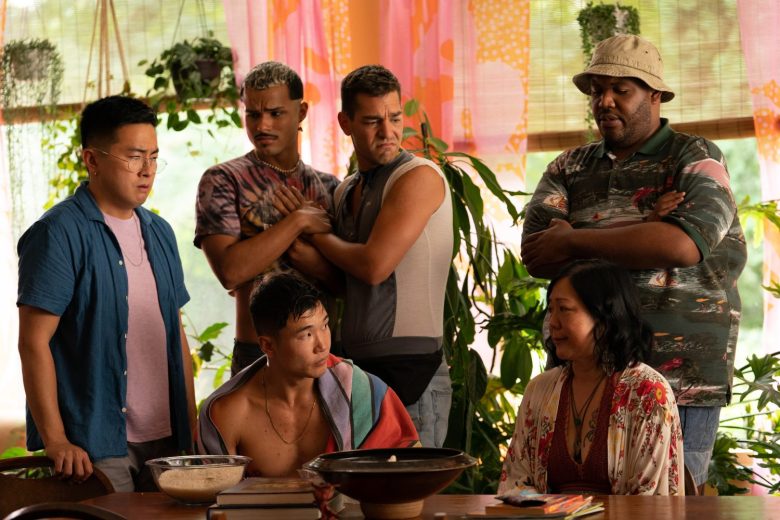
“Fire Island”
I hope we see more films that explore intersectionality. I think it’s really important that we look for characters who feel really three dimensional and they’re not defined just by one aspect of who they are. I really want people to seek out independent cinema and go to film festivals, because I think there are films there that are going to scratch an itch that they’re not ever going to get from big budget studio movies.
Céline Sciamma: It really depends as independent cinemas are struggling everywhere. Those voices that were already the more precarious side of the production. Our voices are even more threatened. But I don’t know that I expect something from cinema. The most invigorating queer voices that are striking me today they can be on Instagram, they can be on TikTok, they can be on TV. They are on TV, they’ve been on TV for so long.
I’m excited for surprise wherever it comes from. I mean, I’ve just watched “Rothaniel,” Jerrod Carmichael’s stand-up special for HBO. That, for instance, is groundbreaking. That is as striking as what cinema could bring, maybe even more. I’m just excited for the contemporary. And then the other thing that we must do is get back our history because, there’s been incredible film made by lesbian, I know for instance that are not accessible, that they’re not teaching, that are not preserved, that have disappeared. That might disappear if we don’t.
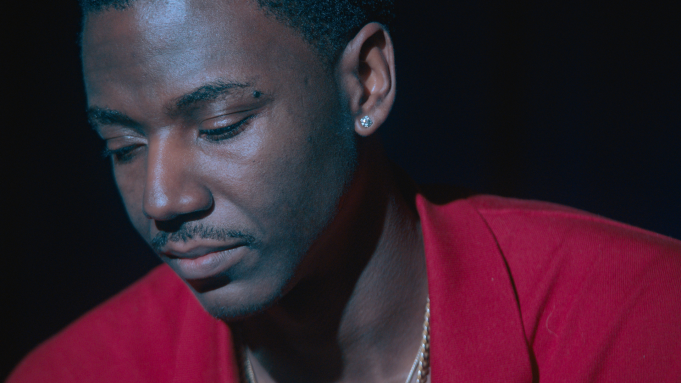
“Rothaniel”
What matters is contemporary and continuity, I’m not saying history, I’m saying continuity. Every day I’m thinking, “Maybe tonight I’m going to watch something that’s going to blow my mind.” Like “Rothaniel,” for instance. So this is also very, very important, because otherwise it’s always about who’s best, who’s leading and I’m really, really also looking for resonance. This is a language that it’s been built collectively. It has history and it’s not only about cinema. It’s a language.
John Cameron Mitchell: Now it’s like, “Write what you know. Stay in your lane. That’s not your story to tell.” Is my story to tell an Asian woman who can’t have an orgasm? I would argue yes. All of the characters in “Shortbus,” I really relate to. I’ve faked an orgasm. I haven’t been a woman in the world, which is a different thing, with that male gaze on me, but I understand her paralysis. I understand the stalker. I understand the dominatrix, to an extent. And it’s in imagination that empathy begins. If it’s nothing but autobiography, we are a solipsistic society that can never get together, which is what it feels like lately.
I think the beginning of the end of that golden era of ’90s and 2000s, which they say started with “Sex, Lies, and Videotape” in ’89 and ended maybe in 2007 with the economic collapse. “Shortbus” came out in 2006, and we had this incredible lavish opening at Cannes with a huge concert on the beach and stars showing up, and then the next year it was austerity, and the films were fewer and less expensive. I think we might have been one of the last couple of films that fit into that category that didn’t need to be anchored by a star.
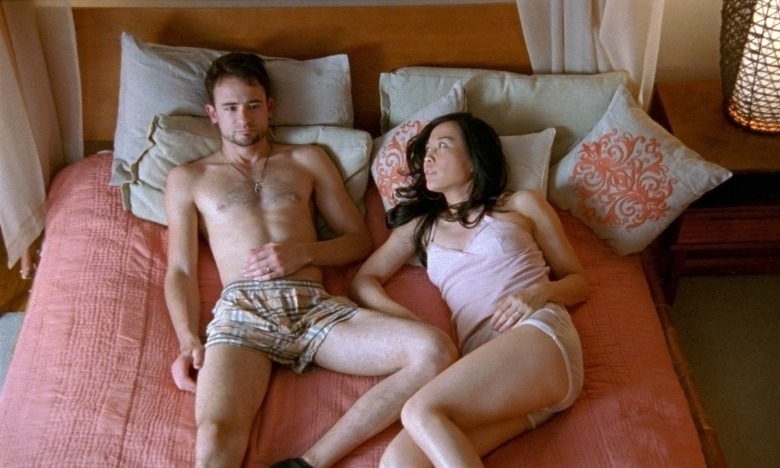
“Shortbus”
©Think Film/Courtesy Everett Collection
Now it’s like any independent film has to have stars in it, unless it’s made for half a million dollars, and then it’s your mom paying for it. But everything has to have a star in it, because that’s how you get an Oscar nomination and attention. And that can be fine, but there’s plenty of people who aren’t, and need to be… But they just turned their eyes to other forms, to television, to podcast, to stand-up, to theater, to other forms. And I’m happy to do that myself.
Jared Frieder: It’s so hard to get gay shit made. I never thought it would actually ever end up happening for me, because I had faced so much rejection and had heard so many nos. So this moment is particularly surreal. It’s near impossible. And that’s the truth of my experience. I don’t want to speak for anybody else.
I’m so grateful that the Greg Berlantis and the Ryan Murphys and the Joey Soloways of the world exist, because they are powerful enough that they can get stuff made. But for up-and-coming young people like myself and my friends, it’s really challenging. And I’m a white man, so imagine how challenging it is for trans, non-binary, people of color, Indigenous people, Black storytellers to get their films made. It’s really, really challenging. They say, “We can’t sell this internationally because of the subject matter,” I heard once. I have heard, “We’re going in a different direction.” I’ve heard, “There’s been leadership changes.”
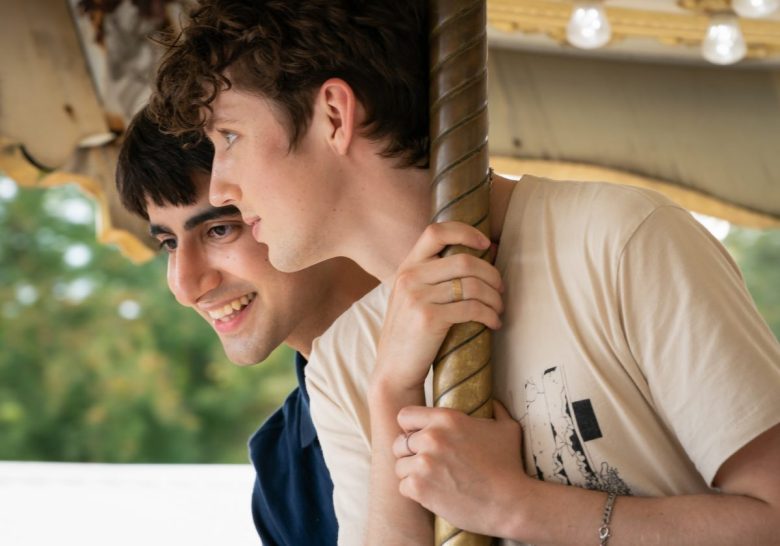
“Three Months”
Brian Douglas
When you’re selling queer/LGBTQ-protagonist projects, the people who are buying are development executives who are younger and up and coming and they get to decide what scripts they pay for, what pilots get put into development. But in order to go from development to getting a series made, you have to go through the people that run these companies. These older, more patriarchal, structured systems that will pay a couple hundred thousand to put something in development, but won’t pay to get it made because of the subject matter. Because they don’t see our stories as commercially viable.
Rain Valdez: For me, it’s a double-edged sword. As an actor, creator, writer, I have to play a game just to keep going in this industry. So when I started campaigning for the Emmy, I had a very specific message, which was, “Here’s to adding an option on the ballot that’s queer, that’s trans, that’s a person of color, that’s female-led, that’s Asian American.”
So that was my, “Here’s how I’m going to make myself stand out,” allowing my identity to work for me. But the double-edged sword is that I want to get to a point where I’m not always consistently referred to as “transgender actress Rain Valdez.” So I’m at a point now where we just gave the industry the option of referring to me as something else, Emmy-nominated actress Rain Valdez. And so there’s a double-edged sword there of, “Yes, you can refer to me as a transgender actress.” Because people need to know, people need to see it, because that’s part of the change we’re trying to make. But at the same time, it consistently otherizes me from the other actresses.
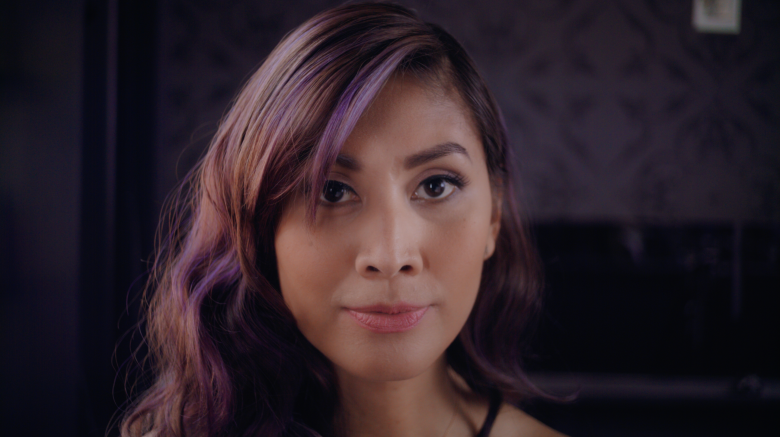
Rain Valdez in “Razor Tongue”
Courtesy of the filmmaker
Very early on I just wanted to be an actress and that was the only interest I had. Over the years, that proved to be very challenging, and I firmly believe it had a lot to do with how I identified and how I looked as an Asian American trans woman. Roles weren’t specifically tailored to someone like me. And if they were, it was very stereotypical. I’ve always told people that I want to play the transgender Sandra Bullock. Why doesn’t that exist and why can’t I play those characters? So I realized that if I wanted to do those things, I had to create them for myself. So that’s how the filmmaking started.
John Waters, for example, bristles at being called an “openly gay director.” In sharing this fact with Luca Guadagnino, whom he spoke to recently at the Provincetown Film Festival, the “Call Me by Your Name” filmmaker concurred. “I don’t believe in openly anything,” Guadagnino said.
There is no doubt that the man who introduced Divine to the world makes queer films, his work is both defines and defies the very label. But it is absurdly redundant to label John Waters a queer filmmaker, as it is to saddle any other artist with a word that can be both empowering and limiting.
But Hollywood is a business, and most people (and producers) have very little imagination. The same issue plagues every creative field, that the act of selling art is in direct opposition to creating anything meaningful. In this unprecedented moment when LGBTQ+ stories feel almost overly ubiquitous, it can seem beneficial to market oneself as a queer filmmaker, but what really goes on behind closed doors?
To take the current temperature, we spoke to four of our favorite queer filmmakers, from venerated auteurs to exciting up-and-comers. Andrew Ahn, who directed the hit gay Asian American rom-com “Fire Island”; John Cameron Mitchell, whose provocative sex romp “Shortbus” was banned on Prime 15 years after its initial release; Céline Sciamma, who went big by playing small in “Petite Maman”; Jared Frieder, whose debut feature “Three Months” starred Troye Sivan and de-stigmatizes HIV; and Rain Valdez, who earned an Emmy nomination for her short form series “Razor Tongue” in 2020.
Some interviews were edited and condensed for clarity.
Andrew Ahn: “Spa Night” for me was a bit of a reaction to campy queer films that I felt like didn’t really capture what I felt was difficult about being gay and Asian American. And with “Fire Island,” it’s a little bit of balancing, like where we can find more of that joy?
I really like to contextualize “Fire Island” within this legacy of queer cinema. I know there’s a lot of desire right now to market films as the “first” of something, but I know we’re not the first queer Asian American rom-com. I love “The Wedding Banquet,” Alice Wu’s “Saving Face” is a favorite of mine. It’s just that “Fire Island” has marketing money behind it. So my hope is that more audiences get to see “Fire Island” and that it inspires them to look back at the wonderful queer canon that we have. And also hopefully inspire filmmakers to make their own personal stories, create their own “Fire Island” so that we have a healthy future.

“Fire Island”
I hope we see more films that explore intersectionality. I think it’s really important that we look for characters who feel really three dimensional and they’re not defined just by one aspect of who they are. I really want people to seek out independent cinema and go to film festivals, because I think there are films there that are going to scratch an itch that they’re not ever going to get from big budget studio movies.
Céline Sciamma: It really depends as independent cinemas are struggling everywhere. Those voices that were already the more precarious side of the production. Our voices are even more threatened. But I don’t know that I expect something from cinema. The most invigorating queer voices that are striking me today they can be on Instagram, they can be on TikTok, they can be on TV. They are on TV, they’ve been on TV for so long.
I’m excited for surprise wherever it comes from. I mean, I’ve just watched “Rothaniel,” Jerrod Carmichael’s stand-up special for HBO. That, for instance, is groundbreaking. That is as striking as what cinema could bring, maybe even more. I’m just excited for the contemporary. And then the other thing that we must do is get back our history because, there’s been incredible film made by lesbian, I know for instance that are not accessible, that they’re not teaching, that are not preserved, that have disappeared. That might disappear if we don’t.

“Rothaniel”
What matters is contemporary and continuity, I’m not saying history, I’m saying continuity. Every day I’m thinking, “Maybe tonight I’m going to watch something that’s going to blow my mind.” Like “Rothaniel,” for instance. So this is also very, very important, because otherwise it’s always about who’s best, who’s leading and I’m really, really also looking for resonance. This is a language that it’s been built collectively. It has history and it’s not only about cinema. It’s a language.
John Cameron Mitchell: Now it’s like, “Write what you know. Stay in your lane. That’s not your story to tell.” Is my story to tell an Asian woman who can’t have an orgasm? I would argue yes. All of the characters in “Shortbus,” I really relate to. I’ve faked an orgasm. I haven’t been a woman in the world, which is a different thing, with that male gaze on me, but I understand her paralysis. I understand the stalker. I understand the dominatrix, to an extent. And it’s in imagination that empathy begins. If it’s nothing but autobiography, we are a solipsistic society that can never get together, which is what it feels like lately.
I think the beginning of the end of that golden era of ’90s and 2000s, which they say started with “Sex, Lies, and Videotape” in ’89 and ended maybe in 2007 with the economic collapse. “Shortbus” came out in 2006, and we had this incredible lavish opening at Cannes with a huge concert on the beach and stars showing up, and then the next year it was austerity, and the films were fewer and less expensive. I think we might have been one of the last couple of films that fit into that category that didn’t need to be anchored by a star.

“Shortbus”
©Think Film/Courtesy Everett Collection
Now it’s like any independent film has to have stars in it, unless it’s made for half a million dollars, and then it’s your mom paying for it. But everything has to have a star in it, because that’s how you get an Oscar nomination and attention. And that can be fine, but there’s plenty of people who aren’t, and need to be… But they just turned their eyes to other forms, to television, to podcast, to stand-up, to theater, to other forms. And I’m happy to do that myself.
Jared Frieder: It’s so hard to get gay shit made. I never thought it would actually ever end up happening for me, because I had faced so much rejection and had heard so many nos. So this moment is particularly surreal. It’s near impossible. And that’s the truth of my experience. I don’t want to speak for anybody else.
I’m so grateful that the Greg Berlantis and the Ryan Murphys and the Joey Soloways of the world exist, because they are powerful enough that they can get stuff made. But for up-and-coming young people like myself and my friends, it’s really challenging. And I’m a white man, so imagine how challenging it is for trans, non-binary, people of color, Indigenous people, Black storytellers to get their films made. It’s really, really challenging. They say, “We can’t sell this internationally because of the subject matter,” I heard once. I have heard, “We’re going in a different direction.” I’ve heard, “There’s been leadership changes.”

“Three Months”
Brian Douglas
When you’re selling queer/LGBTQ-protagonist projects, the people who are buying are development executives who are younger and up and coming and they get to decide what scripts they pay for, what pilots get put into development. But in order to go from development to getting a series made, you have to go through the people that run these companies. These older, more patriarchal, structured systems that will pay a couple hundred thousand to put something in development, but won’t pay to get it made because of the subject matter. Because they don’t see our stories as commercially viable.
Rain Valdez: For me, it’s a double-edged sword. As an actor, creator, writer, I have to play a game just to keep going in this industry. So when I started campaigning for the Emmy, I had a very specific message, which was, “Here’s to adding an option on the ballot that’s queer, that’s trans, that’s a person of color, that’s female-led, that’s Asian American.”
So that was my, “Here’s how I’m going to make myself stand out,” allowing my identity to work for me. But the double-edged sword is that I want to get to a point where I’m not always consistently referred to as “transgender actress Rain Valdez.” So I’m at a point now where we just gave the industry the option of referring to me as something else, Emmy-nominated actress Rain Valdez. And so there’s a double-edged sword there of, “Yes, you can refer to me as a transgender actress.” Because people need to know, people need to see it, because that’s part of the change we’re trying to make. But at the same time, it consistently otherizes me from the other actresses.

Rain Valdez in “Razor Tongue”
Courtesy of the filmmaker
Very early on I just wanted to be an actress and that was the only interest I had. Over the years, that proved to be very challenging, and I firmly believe it had a lot to do with how I identified and how I looked as an Asian American trans woman. Roles weren’t specifically tailored to someone like me. And if they were, it was very stereotypical. I’ve always told people that I want to play the transgender Sandra Bullock. Why doesn’t that exist and why can’t I play those characters? So I realized that if I wanted to do those things, I had to create them for myself. So that’s how the filmmaking started.


